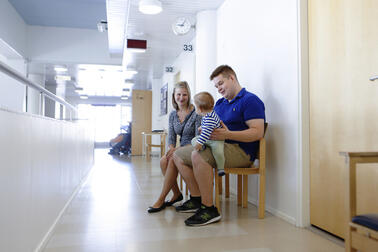
There are many lonely elderly people living at home who have kept to themselves, especially after the pandemic. Many of them would benefit from activities and services.
How could they be encouraged to participate in the activities of service centres again, for example?
That is one of the questions which the City is seeking answers to and receiving support for from the European union via Finland’s Sustainable Growth Programme.
This is a major project, the purpose of which in Helsinki is to help and support the most vulnerable people in particular. This includes lonely older people.
According to Project Manager Taina Hussi, the COVID-19 pandemic increased the backlog in care and services, which the City is now striving to reduce.
The projects’ focus areas include prevention and providing early support to residents. The aim is to also facilitate access to treatment and services by creating new operating models and digital services.
New day activities
Project managers Maarit Ajalin, Nadia Partala and Eero Kenttä provide examples of measures and services that are now being launched or that can now be accelerated.
A year ago, a group-based rehabilitation service called Puhti was started at the Roihuvuori Senior Centre. The service is intended for older people who face challenges with substance abuse or mental health. The rehabilitation period includes an extensive review of the participants’ life situation, from health to financial matters and social relations.
One new service starting next year is Pilke day activities, which are intended for pensioners with both substance abuse and memory disorders. The aim of the new activities is to improve the quality of life of participants, reduce emergency clinic visits and the harmful effects of drinking and monitor the progress of memory disorders.
While service centres have their own peer support groups for elderly people with substance abuse or memory disorders, there is also a need for a service with know-how about both of these.
The City will also be launching a marketing campaign to get more elderly people staying at home to participate in the activities of service centres. There are 15 service centres in Helsinki that offer company for discussions, activities and support for everyday life.
According to Ajalin, some regular visitors have not returned to service centres after the pandemic. Furthermore, service centres are also not very well known among the public, even though they should be as obvious as a service as playgrounds are for families with children, for example.
The City’s senior services will also start training staff on how to serve LGBTQ seniors and to take their needs into account. For example, it may be difficult to join a grief support group if you are the only participant who had a same-sex spouse.
The popular podcast highlighting perspectives on the mental well-being of older people, Käänteentekevää puhetta, has been renewed for another season. The second season features studio discussions with older people themselves.
Sotebotti Hester to become more astute
Digital services also continue to be developed, which is another thing that EU funding is helping with. Sotebotti Hester, which many people are already familiar with, continues to be developed with the aim of further helping with the tackling of the backlog in care and services.
Sotebotti Hester serves the residents of Helsinki around the clock every day. According to Partala, the bot is capable of providing advice on the simplest matters and referring users to the right service with one interaction, reducing the need for additional contacts.
Sotebotti Hester is being trained to answer questions about both social services and health care, whether they are about babies or old age. In some services, it can also transfer you to a live chat with a professional while the chat service is open.
The City is also in the process of adopting new tools and practices that will facilitate and harmonise the utilisation of video appointments.
The continued development of the Omaolo service combined with well-being surveys will provide a clearer understanding of the service needs of residents.
The situation of those queuing for supported housing will be eased with remote appointments. The idea is that people in the queue will be able to chat about their situation with a social welfare professional remotely.
Joint discussions and transfer to lighter services may lead to independent living being strengthened and the need for supported housing being at least delayed.
Increasing awareness of well-being services
In a city the size of Helsinki, activities and events that promote well-being and health take place all the time, but residents may not always be able to find information about them. According to Kenttä, the City is developing a new digital platform that will aggregate information about activities that promote well-being and health in one place.
In addition to the City's services, the platform will include information about activities organised by NGOs.
Having all this information in one place will also make it easier for professionals to recommend activities to residents. For example, a doctor could provide their patient with information about a sports or exercise group operating in the patient’s neighbourhood. The website will be launched by the end of 2024.
Finland's Sustainable Growth Programme is funded by the European Union Recovery Instrument (Next Generation EU). Its objective is to strengthen well-being and prevent problems. The programme is coordinated by the Ministry of Social Affairs and Health and is being implemented in all of Finland’s wellbeing services counties and Helsinki.


